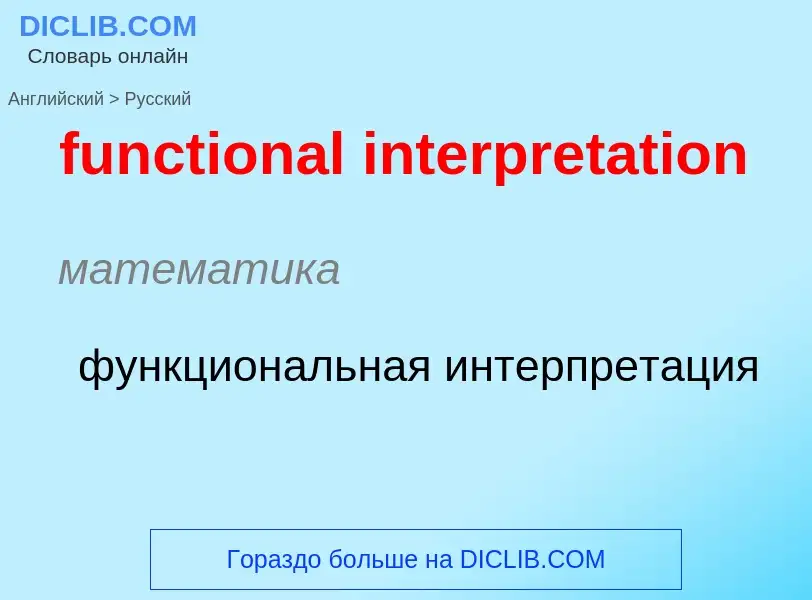Μετάφραση και ανάλυση λέξεων από την τεχνητή νοημοσύνη ChatGPT
Σε αυτήν τη σελίδα μπορείτε να λάβετε μια λεπτομερή ανάλυση μιας λέξης ή μιας φράσης, η οποία δημιουργήθηκε χρησιμοποιώντας το ChatGPT, την καλύτερη τεχνολογία τεχνητής νοημοσύνης μέχρι σήμερα:
- πώς χρησιμοποιείται η λέξη
- συχνότητα χρήσης
- χρησιμοποιείται πιο συχνά στον προφορικό ή γραπτό λόγο
- επιλογές μετάφρασης λέξεων
- παραδείγματα χρήσης (πολλές φράσεις με μετάφραση)
- ετυμολογία
functional interpretation - translation to ρωσικά
математика
функциональная интерпретация
[in'tə:pritə]
общая лексика
интерпретатор
программа или среда программирования, в которой можно выполнить трансляцию исходного текста разрабатываемой программы и её выполнение без получения соответствующего машинного кода. Выполнение программы интерпретатором требует значительно больше машинного времени, чем исполнение обычной программы, но при этом меньше времени тратится на разработку и отладку программ
истолкователь
толкователь
устный переводчик
вычислительная техника
дешифратор
Смотрите также
существительное
общая лексика
устный переводчик
интерпретатор
толкователь
интерпретатор, истолкователь
переводчик (устный)
вычислительная техника
интерпретирующая программа
(программа-)интерпретатор
музыка
исполнитель
исполнительница
Ορισμός
Βικιπαίδεια
Heritage interpretation refers to all the ways in which information is communicated to visitors to an educational, natural or recreational site, such as a museum, park or science centre. More specifically it is the communication of information about, or the explanation of, the nature, origin, and purpose of historical, natural, or cultural resources, objects, sites and phenomena using personal or non-personal methods. Some international authorities in museology prefer the term mediation for the same concept, following usage in other European languages.
Heritage interpretation may be performed at dedicated interpretation centres or at museums, historic sites, parks, art galleries, nature centres, zoos, aquaria, botanical gardens, nature reserves and a host of other heritage sites. Its modalities can be extremely varied and may include guided walks, talks, drama, staffed stations, displays, signs, labels, artwork, brochures, interactives, audio-guides and audio-visual media. The process of developing a structured approach to interpreting these stories, messages and information is called interpretive planning. The thematic approach to heritage interpretation advocated by University of Idaho professor Sam Ham, the National Association for Interpretation, the US National Park Service, and others, is considered best practice.
Those who practice this form of interpretation may include rangers, guides, naturalists, actors (who may wear period dress and do reenactments), museum curators, natural and cultural interpretive specialists, interpretation officers, heritage communicators, docents, educators, visitor services staff, interpreters or a host of other titles. The interpretive process is often assisted by new technologies such as visualizing techniques.

![Part of the music education for children in primary school is to assemble a do-organ from [[Orgelkids]] Part of the music education for children in primary school is to assemble a do-organ from [[Orgelkids]]](https://commons.wikimedia.org/wiki/Special:FilePath/2013 Orgelkids Doe-orgel toetsen verbinden aan de windlade.jpg?width=200)
![A [[park ranger]] at [[Biscayne National Park]] in Florida, USA, show a [[hermit crab]] to children. A [[park ranger]] at [[Biscayne National Park]] in Florida, USA, show a [[hermit crab]] to children.](https://commons.wikimedia.org/wiki/Special:FilePath/Biscayne National Park H-ranger kids hermit crab.jpg?width=200)
![Nuremberg defendants]] at dock listening to simultaneous interpretation Nuremberg defendants]] at dock listening to simultaneous interpretation](https://commons.wikimedia.org/wiki/Special:FilePath/Defendants in the dock at nuremberg trials.jpg?width=200)
![operation]] to his [[servant]], who acts as an interpreter operation]] to his [[servant]], who acts as an interpreter](https://commons.wikimedia.org/wiki/Special:FilePath/Dr. Thomas Colledge with Patients.jpg?width=200)
.jpg?width=200)

![Interpreter (left) next to Swedish filmmaker [[Johannes Nyholm]] at [[Buenos Aires International Festival of Independent Cinema]] 2019 Interpreter (left) next to Swedish filmmaker [[Johannes Nyholm]] at [[Buenos Aires International Festival of Independent Cinema]] 2019](https://commons.wikimedia.org/wiki/Special:FilePath/Johannes Nyholm presenting Koko-di Koko-da at BAFICI 2019.jpg?width=200)
![Simultaneous interpreter's station (Televic Conference) at the [[European Court of Justice]] Simultaneous interpreter's station (Televic Conference) at the [[European Court of Justice]]](https://commons.wikimedia.org/wiki/Special:FilePath/Simultandolmetscheranlage.jpg?width=200)
![[[Stéphane Brizé]] (second from the right) speaking in French in [[Buenos Aires]] in 2019. Seated to his left, the interpreter (on the extreme right) waits to translate into Spanish. [[Stéphane Brizé]] (second from the right) speaking in French in [[Buenos Aires]] in 2019. Seated to his left, the interpreter (on the extreme right) waits to translate into Spanish.](https://commons.wikimedia.org/wiki/Special:FilePath/Stéphane Brizé in Buenos Aires in 2019.jpg?width=200)
![A US military interpreter sits with Afghan army soldiers, [[Ghazni province]]. A US military interpreter sits with Afghan army soldiers, [[Ghazni province]].](https://commons.wikimedia.org/wiki/Special:FilePath/U.S. Army Sgt. Bardia Afsari, left, a translator assigned to the 1st Brigade Combat Team, 82nd Airborne Division, talks with Staff Sgt. John Evans, right, assigned to 340th Military Information Support Team 120528-A-NI188-030.jpg?width=200)
